- Home
- Jason Webster
Duende Page 2
Duende Read online
Page 2
‘Drink this, Watson. It will make you clean on the inside.’
We spent mornings at Pedro’s house picking ripe figs, oranges and pomegranates from his orchard to make exotic juices for breakfast.
He had managed to create on a small scale what I imagined the great Arab gardens of the past had been like. The Moorish conquerors had a desert people’s natural love of gardens and their irrigation systems had turned parts of the eastern coast into one of the most fertile areas in Europe. When Philip III had the last remaining Muslims thrown out of Valencia in a fit of pique at the beginning of the seventeenth century, the local economy collapsed, as the only people with the necessary gardening know-how – built up over nine hundred years – had been forced from their homes into exile. Some said the knowledge had never been fully recovered, but sitting in Pedro’s garden, I was prepared to believe they were wrong. Here you could rest, a deep rest that saturated the entire body. And slowly I began to feel myself falling under the spell of the place, days with no beginning or end, my mission almost forgotten.
But then with a jolt it would return, like a violent itch. There were things to be done. I must be on the move. I wanted to start learning flamenco. Alicante, the home of my only contact, had seemed the obvious place to start, but on my few walks around town I had found no flamenco bars, no guitarists idling in the shade, no dancers practising their steps on the street, nothing. At that time I had only a vague idea that flamenco was to be found in Andalusia, and looking at the map, Alicante hadn’t seemed that far away. Surely I would find evidence of it on every street corner? But as my limited searching led nowhere, I began to understand how ill-prepared I had been. I had no idea where to start or what to expect. Pedro would know what I needed to do.
No sooner had I found him, though, watering the date palms and feeding TV, his exquisite white-furred cat, than he distracted me with yet another story. The little local train – the trenet – passing next to the garden, jolted us out of our chatter as it thundered along its single track, belching out black diesel fumes.
‘Ah, mi querido Watson,’ said Pedro, as our lazy afternoon was shattered once again, ‘qu’est-ce qu’on peut faire?’ And he shrugged his shoulders and pouted in a Gallic manner, a hangover from his student days in France. He liked to remind me that it was back in Paris that he had been given a part in the film of What’s New Pussycat? – a token Spaniard at a fancy dress party.
‘Hombre, they wanted me to take a bigger role, but I wasn’t interested. I was too busy trying to get to know the girls at the Sorbonne.’ His eyes twinkled.
For an erstwhile movie star and seducer of Parisian women, Pedro hardly looked the part. Age had taken its toll. Take away the belly and the grey hair and . . . maybe. But it required a leap of the imagination. Perhaps the girls were big on moustaches back then.
And so I spent these first days at Pedro’s acclimatising as best I could to the new environment. Spanish was relatively easy to pick up – having already learned Italian and Arabic, it felt more like I was remembering it than learning it for the first time, and within a week English had all but disappeared. I learned how to cook tortilla de patatas and cocido (a type of stew), weeded the garden while Pedro gave his classes at the university, walked over dusty fields to the beach, and swam in the late summer sun. But all the while, at the back of my mind, a nagging, restless voice was pressing me to begin my search in earnest.
‘So you want to know about flamenco?’ Pedro asked one morning at breakfast. I heaved a sigh of relief. He stared into the sky and began to recite:
Empieza el llanto
de la guitarra.
Se rompen las copas
de la madrugada.
Empieza el llanto
de la guitarra.
Es inútil
callarla.
The cry of the guitar begins.
In the early morning,
wine glasses shatter.
The cry of the guitar begins.
Useless
to silence it.
It was Lorca, the flamenco poet. Pedro’s eyes moistened as he kept his gaze on the darkening clouds above.
‘Of course, I myself am also a poet. As we all are,’ he said.
‘Really?’ I asked. ‘I’d like to see some of your poetry.’
‘Hombre, what makes you think I’ve written any?’ There was a stern expression on his face. ‘You do not have to write poetry to call yourself a poet. The two things are entirely separate.’
‘I see,’ I said.
‘Flamenco,’ he said. ‘No-one even knows the origin of the word. Some say it was a term used by Spanish Jews for songs their relatives were allowed to sing after moving to Flanders, but which they themselves were forbidden by law to perform. Or perhaps you’d rather go for the Arabic version: that it comes from felah manju, or escaped peasant.’ He screwed up his nose sceptically. ‘If felah manju, why not felah manghum – melodious peasant? You can speculate for ever.’
I listened to him eagerly. I was finally getting somewhere.
‘I can’t help you much with flamenco, mi querido Watson,’ he said eventually. ‘I know nothing about it.’
My heart sank. I was relying on him. How could he not know anything about it? I felt sure he would be able to put me on the right track. He seemed to know so much about so many things. My mind raced forward, thinking about other opportunities, other places in Spain I could go to. I could even catch the bus tonight. No reason to stay here. I could manage on my own. Granada perhaps. Or Seville. Jerez?
Pedro’s voice interrupted my feverish plan-making.
‘Don’t worry. I’m sure something will come up when the time is right.’ And he smiled at me, a warm, genuine, childlike smile. For some reason I believed him.
‘There’s a performance this evening in the main square in town,’ Pedro told me three days later. From the expression on his face I knew exactly what he meant.
‘Dancing! Dancing!’ he cried, and skipped his way into the house, clacking his fingers above his head.
It was midnight by the time we arrived. I thought we might have missed it.
‘Don’t worry,’ said Pedro. ‘They won’t have started yet.’
I had already seen enough of Spaniards and their bizarre relationship with time to know he was right. The Spanish were Arab enough always to arrive late, but European enough to feel guilty about never being on time. It created a strange kind of neurosis.
We found the Plaza Mayor, an odd square with an elegant baroque town hall on one side, and ugly 1960s blocks on the other three. A stage had been set up in the middle of the square, and already the place was crowded. No seats, no tickets, everyone simply standing around waiting for it to start. Our late arrival meant we were unable to get a good view and it was impossible to squeeze through any closer to the stage. I stood on tiptoe, grateful that I was taller than most of the audience.
On the stage sat three men: two guitarists and an older man with a stick. Next to them sat three very large women. Were they going to dance? Without warning the music began. Simple chords at first, difficult to hear: there was no real attempt by the audience to quieten down. Women were chatting, children running around, babies crying.
One of the fat women stood up, the low hum-like song began, and the audience fell silent.
‘Did you feel it?’ Pedro asked again when the piece was over.
‘Yes,’ I said.
‘No,’ he said. ‘Did you really feel it?’
I couldn’t speak. The performance had filled me with something I had never felt before, and didn’t know how to describe.
‘That was duende,’ he said.
The word only half-registered. Duende. It sounded familiar. Perhaps I had heard it before somewhere.
When the concert seemed to be winding down, I gestured to Pedro that we should go.
‘Wait,’ he said, moving closer to the stage. ‘There’s more.’
I looked up and saw a man helping up a fourth dancer: a
younger, slimmer woman with a head of wavy, dark red hair. She seemed reluctant to dance at first, as though needing encouragement from her friends. I watched her as she held back, using her weight against the numerous arms and hands that were pulling and pushing her onto the stage, while at the same time the expression on her face revealed she was glad of their attentions and had been expecting this. Finally she conceded, and gracefully walked to the centre of the stage, a long-fringed black silk shawl thrown over her raised shoulders, the blood-red dress swaying from side to side with each step, her hands held on her waist. I tried to see her face, but she had lowered her head, and wisps of red hair masked her eyes.
She began to dance, both arms raised, wrists arched, fingers extended and crooked, like flames. The guitars came in, and an old man started to sing in a high-pitched, strangely feminine voice. But something was wrong. She was dancing in rhythm, her body moving well with the music, but there was a confidence missing, as if she couldn’t quite find her feet, as if she didn’t belong there. The other dancers behind her could sense it, and began shouting encouragement, egging her on. She danced harder, beating the floor until the sweat shone on her brow, her arms rising and circling like storm clouds. As she danced, her hair came loose from the knot at the back of her head until it was flying in all directions, while her hips moved playfully and erotically from side to side.
But it was not to be. She slipped and fell forward, her feet folding beneath her. Her shoes couldn’t grip the temporary stage and she almost crashed to the floor, just managing to save herself from falling flat on her face at the last minute. Recovering, she raised her arms defiantly with a flourish and stormed off in disgust. The guitarists quickly nose-dived to conclude the piece, and the concert ended abruptly.
There were cries from the audience, cheers, some jeering. Everyone seemed confused. There was a sense of anticlimax, but eventually the crowds began to move. Pedro and I looked at each other and shrugged. It was time to go.
‘Pedro,’ I asked as we walked back to the car, the narrow streets crawling with people as they headed off, ‘what is duende?’
He didn’t reply at first, but waited until we had emerged onto the esplanade.
‘Duende,’ he said. ‘Duende is duende. More than this you will have to find out for yourself, mi querido Watson. That is, after all, what you are here for.’
I urgently needed to earn some money, and the only simple way was to teach English. The Yellow Pages listed dozens of language schools with grandiose-sounding names like the Big Ben Academy, or the Cambridge College for English. After a few calls I quickly established that most of them had either gone bust, never existed in the first place, or had plenty of teachers, thank you, but would I like to re-apply next autumn? Pedro tried to help, but none of his contacts within the Spanish equivalent of the old-boy network – Augustinians, the Jesuits, or the Franciscans – managed to produce anything. Inwardly, I heaved a sigh of relief, not relishing the thought of working for monks. I went back to the Yellow Pages and did some more phoning. A couple of schools eventually invited me to come and look around, but they weren’t promising anything.
First I went to the London School. It was opposite the old tobacco factory – a nineteenth-century building like a military barracks that exuded a terrific, all-pervading stink of cigars. I made my way up the stairwell. The ‘school’ was just a spare room in a flat. A small, fat, middle-aged man with greased-back greying hair and a moustache welcomed me with a yellow smile. Would I like a seat? A cigarette? I sat down. It was a small, dark room, with a few chairs and tables, and a blackboard on one wall. In the back of my mind I had already decided not to work here, but felt I should stay and hear him out for courtesy’s sake. He said nothing, though, and simply looked at me with an uncomfortably intense gaze, a grin stuck to his face as though it had been cut out of card and glued there. Finally he lowered his head and began studying my CV.
‘Of course, it is always an honour to be able to welcome someone from Oxford. But, you know, times are bad. These politicians are just thieves. Under Franco this never happened.’
I was thrown by this opening gambit and hesitated for a moment as I tried to work out what an English teaching job had to do with the odd little dictator. Close on two decades had passed since his death in 1975, and the country had made its successful leap into democracy, thanks largely to the king, Juan Carlos. But even after just a short time in Spain I had the strong sensation that you only had to scratch a little below the surface to find Franco staring you in the face. Frustrated-looking men in their fifties always seemed to be the most nostalgic for the good old days of Fascist rule.
‘What never happened?’ I asked, still trying to fathom his logic.
‘All this! Corruption! These Socialists are syphoning off billions! Billions! Spain could be a great country with all its wealth, like Great Britain, or France.’ There was a touch of hysteria in his voice. ‘But instead these villains are holding us down in the Third World. We need a new Franco. A strong man who would make us great again. Not the bunch of criminals in charge at the moment. You wait, though. Our time will come!’
I looked at the man in front of me: the thin moustache, the stout build, small, mean eyes. He wasn’t too dissimilar to the Generalísimo himself. He would probably do well as a small bureaucrat in a dictatorship, seated at an oversized desk, little legs swinging underneath his chair.
‘You never saw any beggars on the streets in his time . . .’ He was off again, but seemed to realise he was losing his audience.
‘So, as you can see, things are tight,’ he concluded. I began to feel annoyed. Had I come all this way just for a lecture on right-wing politics from a man who, before I’d even taught a single class, was trying to lower my salary?
‘Of course, we can always come to an arrangement,’ he added hurriedly. I was confused. He clicked his fingers like a character in a Bond film. The door behind him opened and a woman with peroxide blond hair and a low-cut, revealing dress appeared. She walked forward and stood next to the smiling man, rocking her hips suggestively and looking at me with a sweet, sickly smile of her own.
‘If you help us,’ said the man, ‘we can help you. You understand me?’ I looked in astonishment. The woman lifted her index finger, ending with a false red nail, to her over-painted lips and began sucking and nibbling at it. My forehead knotted as her eyes ran up and down me like a snake. I looked back at the man. He was still smiling. I was smiling, but feeling sick. At the other end of the room a fly was buzzing at the window, desperately trying to get out.
‘My wife is very . . . er, demanding.’
I stood up suddenly. I was sure his wife was lots of things, but I didn’t want to find out about any of them.
‘You know, it has been lovely coming here and seeing your lovely school,’ I stammered, walking backwards towards the door. ‘And I hope you do find the teachers you need. But I don’t think Alicante is the place for me. I think I really want to live in, er, Greece. Yes, Greece.’ I reached behind me and found the doorknob.
‘But señor,’ the man interjected. The smile was fading now, on its way to a scowl of disappointment.
‘I’m sorry,’ I said, and ‘Goodbye,’ as I hurriedly passed through the door.
I stumbled down the stairs and out into the tobacco-thick air. Pedro was waiting for me, and seemed to have some intuition of what had happened.
‘Come with me.’ He grabbed my arm and dragged me quickly into a church on the other side of the road. We sat down on a pew and he made me repeat an Arabic verse.
‘This is very good. It will cleanse you,’ he said.
My head was spinning. Maybe I should go somewhere else after all. The only things Alicante had for me so far were unreconstructed Fascists who liked watching foreign men satisfying their wives, and romantics who recommended reciting Islamic prayers in Catholic churches. But there was still the other school to visit, a long way from here, on the other side of town.
They offered me tw
o classes a week, starting at the end of the month. Things were not looking good. As I was leaving, one of the staff suggested another school in the centre of town: Escuela Uno. I had been told it was the best language centre in the city. This had put me off, as they were sure to be flush with teachers. But at this point there was nothing to lose.
The school was situated in a sidestreet. I climbed the bare, institutional stairs. The door was open and the lights were on, but it looked empty. A noise came from behind the tall desk in the reception area. I turned and a woman stood up. I noticed her dark red hair, engaging eyes, a look of defiance about her. It was the dancer who had nearly fallen at the flamenco performance a few nights before. The night of my first experience of duende.
She caught my hesitation. ‘Well,’ she snapped, ‘I suppose you’ve come here looking for a job.’
‘Yes,’ I hit back. ‘As a matter of fact I have.’
‘Oh,’ she responded, more softly. ‘Well, you might be in luck then. One of the girls we hired has dropped out, so there’s a vacancy. But you’ll have to see my husband Vicente.’ She spoke rapidly, pushing the words out forcefully. ‘Where’s your CV?’
I handed it over and she stared at it, looking down her long nose, her head poised, nostrils flared. There was a powerful energy about her that seemed out of place in the surroundings of a school. The silence was broken by the sound of footsteps. I turned to see a man with an air of authority striding over towards us. He looked like a thousand other moderately successful Spaniards in their forties: neat beard with a few white hairs sprouting, combed-back, straight black hair, a thick aquiline nose, sports jacket and black trousers. The only difference was that instead of wearing Spanish shoes, he was sporting a pair of highly polished English brogues.
‘Vicente, this young man wants a job,’ the woman said coolly. He smiled and shook my hand, then placing his fingers in the small of my back, he propelled me towards an empty classroom.

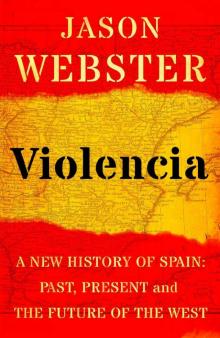 Violencia
Violencia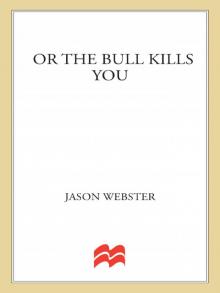 Or the Bull Kills You
Or the Bull Kills You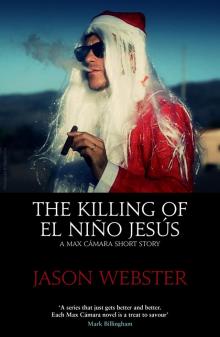 The Killing of El Niño Jesús
The Killing of El Niño Jesús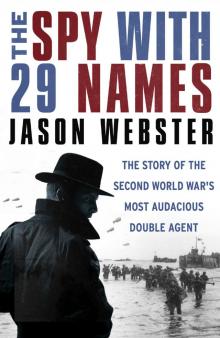 The Spy with 29 Names
The Spy with 29 Names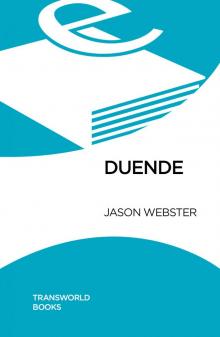 Duende
Duende Guerra
Guerra Sacred Sierra
Sacred Sierra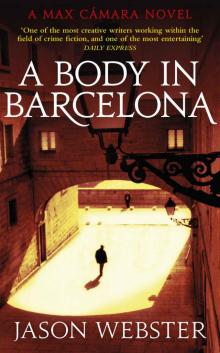 A Body in Barcelona: Max Cámara 5
A Body in Barcelona: Max Cámara 5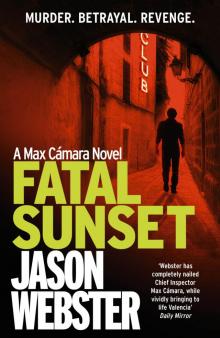 Fatal Sunset
Fatal Sunset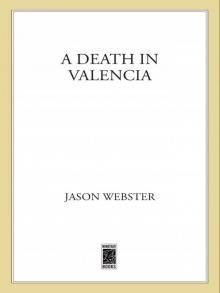 A Death in Valencia
A Death in Valencia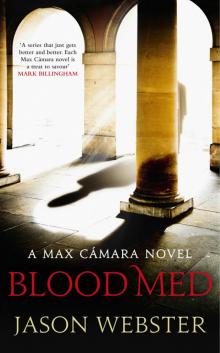 Blood Med
Blood Med Andalus
Andalus